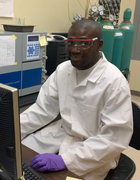March 26, 2020

Name: Dr. Leye Adeboye
Institution: Oklahoma State University
Place of Residence: Stillwater, Oklahoma, USA
What kind of science do you do?
I am primarily interested in the origin and fate of sedimentary organic matter across various environments. Currently, I am investigating environmental conditions at time of deposition of the Mississippian Limestone interval within the Anadarko shelf of Oklahoma using multiproxy, geochemical techniques including stable isotope geochemistry, trace element geochemistry and biomarker geochemistry. My current work will also examine the source rock characteristics of the Mississippian Limestone interval within the Anadarko Shelf.
How did you find out about the society?
I was introduced to the GS by a colleague of mine here at Oklahoma State University and I have been a member ever since.
How is the society beneficial to your studies? Your personal life?
The GS is beneficial to my studies because it provides a forum to network with fellow earth scientists and also provides an avenue for me to share findings from my work with the wider geoscience community. Personally, I have made some good friends from across the globe by being an active member of the GS.
What is the most interesting thing about your field of research?
The most interesting things to me about my field of research are the versatility of the work and the interdisciplinary nature of what I do. I can apply various (organic and inorganic) geochemical proxies to modern or very old samples of different lithologies and I get to incorporate results and supporting evidence from other subdisciplines too (e.g., paleontology, stratigraphy, borehole geophysics, etc).
Why do you think your field of work is pertinent to the world of geochemistry?
I believe that my field of work is pertinent because understanding the origin and fate of organic matter and carbon cycling in general is critical and has applications in resource exploration, exploitation and in environmental remediation as well as in understanding changing climates across Earth's history.
What is one obstacle in your field of work that you wish you could overcome?
If there was a way to make sample preparation less tedious/even more automated than it is, that would be great, I would be over the moon if I never had to wrap anymore samples for analysis in the EA-IRMS because a robot could do that for me!
What is one unique memory you have from working in your field of study?
The first time I observed coal (so basically 100% terrestrial organic matter) under a microscope...just seeing the various macerals and pore spaces in something which looked black to the naked eye was fascinating to me. I have really never stopped being fascinated by organic matter since that time.
If you could discover one thing in the entire world, what would that be?
The origins of life! I guess if I am allowed a second discovery, I would love to be able to define what exactly organic matter is without having to resort to functional definitions based on how organic matter is isolated or measured.
If you could meet anyone, dead or alive, who would that be and why?
I would love to meet Nelson Mandela, ex-president of the Republic of South Africa. His patience throughout the apartheid struggle in that country amazes me. While geochemistry is not in any way being equated to the struggle for equality in South Africa, sometimes a lot of patience is required in the course of doing my work in the lab too so I am sure I could pick up a few tips from the late, great gentleman.